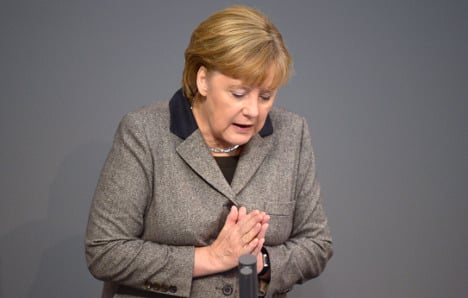Addressing lawmakers in the Bundestag lower house of parliament, she said the deal clinched earlier in Brussels just hours before an EU summit was of inestimable value and had met German concerns.
“It cannot be valued highly enough that eurozone finance ministers agreed overnight on a legal framework and the outlines of a common supervisory mechanism for banks,” she said.
And she thanked German Finance Minister Wolfgang Schäuble, saying that Berlin’s “core demands” had been met in the agreement.
The complex bank supervision deal is a key step towards a banking union which EU leaders hope will ring-fence banks in trouble to prevent future crises.
It will allow eurozone banks to be recapitalised directly, rather than through governments, so as to avoid adding to their growing debt burden.
The European Central Bank (ECB) will manage the eurozone system in tandem with the London-based European Banking Authority, which covers all 27 EU states, and national supervisors.
From March 2014, banks with assets worth more than €30 billion or equal to 20 percent of a state’s economic output will come under the ECB remit.
The ECB will also have to right to intervene in cases involving smaller banks but it is expected that national supervisors will have the main responsibility in this category.
Turning to Greece, Merkel said she hoped the Eurogroup would approve the payment of the next tranche of aid for Greece later on Thursday, adding “anyone dealing with Greece’s circumstances knows that it is urgently necessary.”
“The implemented buy-back programme of state bonds has provided an important contribution to the improvement of its capacity to bear debt,” she added.
On Wednesday, Athens announced it had attracted offers worth €31.9 billion under the debt buy-back scheme.
The buy-back aims to cut Greece’s debt by about €20 billion and is vital to unblock pending loans from the European Union and International Monetary Fund, which were frozen earlier this year owing to reform delays.
AFP/bk



 Please whitelist us to continue reading.
Please whitelist us to continue reading.
Member comments